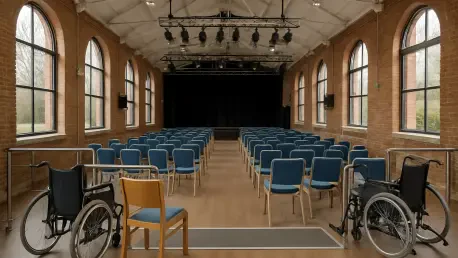What happens when a single step, a missing caption, or an inaccessible website prevents someone from attending a pivotal business event, denying them access to crucial opportunities? In an era where diversity fuels innovation, exclusion is not just a personal loss—it’s a professional setback for entire industries. Millions of people with disabilities worldwide, including over 14 million in the UK alone according to government data, face such barriers daily. This stark reality has spurred a groundbreaking movement led by ICC Wales, positioning the venue at the forefront of redefining inclusion in the UK events sector.
Why Accessibility Matters Now More Than Ever
The impact of inaccessible events extends far beyond inconvenience. For individuals with disabilities, whether visible or non-visible, being unable to attend a conference or networking event can mean missed career opportunities, stifled ideas, and diminished voices in critical discussions. The ripple effect touches businesses too, as diverse perspectives are essential for problem-solving and growth in competitive markets.
Social expectations have shifted dramatically, with attendees demanding environments where everyone can participate fully. A 2023 study by the World Health Organization noted that accessible design not only benefits individuals with disabilities but also enhances overall user experience, boosting engagement by up to 60% at public events. This growing awareness underscores the urgency for the events industry to adapt swiftly.
The Global Push for Inclusive Event Spaces
Across borders, the call for accessibility resonates louder as international standards evolve. The European Accessibility Act (EAA), enforced across the EU, mandates that services and products, including events, meet specific inclusivity criteria. Even outside the EU, UK venues hosting global delegates must align with these benchmarks to remain competitive and relevant in a connected world.
This demand is fueled by the rise of cross-border collaborations, where events often draw participants from diverse backgrounds. Catering to varied needs—ranging from physical mobility aids to digital accommodations for neurodiverse attendees—has become a hallmark of modern event planning. ICC Wales’s timely research initiative taps into this global trend, aiming to set a precedent for UK-based organizers facing similar pressures.
Inside the Groundbreaking Research by ICC Wales
At the heart of this transformation lies a pioneering project spearheaded by ICC Wales in collaboration with The Business of Events and supported by the All-Party Parliamentary Group for Events. A comprehensive UK-wide anonymous survey, open until July 31, 2026, targets venues and planners to uncover real-time insights into accessibility practices, pinpointing gaps and challenges across the sector.
The research dives deep into multiple dimensions, examining venue infrastructure like ramps and seating, digital access through compliant websites, sensory accommodations for sound and light sensitivity, and innovative AI tools tailored for neurodiversity. A whitepaper released earlier this year, aligned with EAA and Web Content Accessibility Guidelines (WCAG), showcases practical examples from ICC Wales-hosted events such as the Kidz to Adultz exhibition and SQLBits Data Conference, offering a blueprint for industry-wide improvement.
This initiative stands out for its ambition to not just identify problems but to forge actionable solutions. By integrating data with real-world case studies, the project promises to reshape how events are designed, ensuring they welcome every participant regardless of ability or need.
Expert Insights and Real Stories Driving Change
Credibility and relatability anchor this research through the voices of industry leaders and those with lived experiences. Julie Hammond, Chief Executive of ICC Wales and The Celtic Collection, has highlighted the strategic importance of meeting global standards like the EAA. According to Hammond, embracing inclusivity is not merely a moral imperative but a vital edge in attracting international business and talent to UK shores.
Equally impactful is the guidance of disability inclusion expert Dr. Shani Dhanda, whose expertise shapes the project’s focus on practical, meaningful outcomes. The whitepaper also incorporates firsthand accounts from delegates with diverse needs, ensuring that recommendations reflect authentic challenges faced during events. This blend of authority and personal perspective elevates the initiative’s potential to inspire trust and drive adoption across the sector.
Actionable Steps to Redefine Event Inclusion
Moving beyond diagnosis, the research lays out clear strategies for venues, organizers, and suppliers to revolutionize accessibility. Upgrading physical spaces with features like adjustable lighting and ramps, alongside digital platforms that meet WCAG standards, forms a foundational step toward broader access for all attendees.
Equally critical are sensory-friendly environments and neurodiversity-focused practices, such as quiet zones and clear communication tools, which can transform experiences for many. The integration of emerging technologies, including AI-driven captioning and navigation aids, offers innovative ways to personalize inclusion, ensuring no one is left behind at professional gatherings.
These practical pathways provide a roadmap for immediate implementation. Event professionals can adapt these insights to their contexts, fostering spaces where diversity isn’t just acknowledged but actively supported through intentional design and planning.
Reflecting on a Milestone for UK Events
Looking back, the collaborative effort led by ICC Wales marked a turning point for the UK events industry, igniting a dialogue on accessibility that had long been overdue. The comprehensive research, bolstered by expert input and real-world data, laid a solid foundation for systemic change, challenging outdated norms with evidence and innovation.
As the sector moved forward, the focus shifted to sustaining this momentum through shared accountability. Venues and planners were encouraged to prioritize ongoing training, invest in adaptive technologies, and regularly seek feedback from diverse attendees to refine their approaches. This legacy of inclusion continues to inspire a future where every event opens its doors to all, ensuring that no voice goes unheard in the professional arena.









